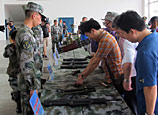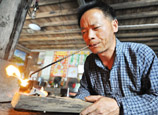
But in 2012, the province produced more than 200 million tonnes of steel.
Local governments have an incentive to continue developing the steel industry, as the sector is a significant contributor in terms of tax revenues and employment, said Song Jijun, deputy director of Hebei's provincial metallurgical industry association.
Steel production has enjoyed rapid growth in Hebei, despite reduced demand for steel products. The province's crude steel and steel product output for the first half of the year totaled 103.35 millon tonnes and 116.56 million tonnes, respectively, up 6.83 percent and 9.06 percent year on year.
The taxes paid by steel producers in Hebei totaled 9.99 billion yuan in the first half, down 29 percent year on year. Their profits also tumbled 41 percent from the previous year to 3.31 billion yuan.
In China's vast underdeveloped central and western regions, local governments are vying to attract investment from the east to drive economic growth despite overcapacity
Although their profits are minimal, steel enterprises have to maintain production, as they don't want to lose their market shares and are afraid of possible loan suspensions by banks, said Liu Zhibiao, head of the provincial academy of social sciences of east China's Jiangsu Province.
Overcapacity has not been limited to traditional industries. Emerging sectors like the photovoltaic and wind turbine manufacturing industries have also had to deal with excess capacity.
Although economists generally agree that overcapacity can be tolerable in a healthy market, China's overcapacity stems from a government-led and investment-driven growth model, rather than the result of normal market operations.
Governments are fueling overcapacity by approving large-scale production that can boost local GDPs and create more jobs, Zhuang said.
Meanwhile, a sluggish overseas market and weak domestic consumption are also leaving many sectors in overcapacity, he said.
Most of the production capacity added in the electrolytic aluminum and cement industries in recent years has been done without government approval, according to a Xinhua investigation.
"The most important thing to do is to restrict the government's role," Zhuang said. "Governments should not make investment decisions on behalf of enterprises."
The government should improve the threshold for market entrance and create an overall industrial development plan instead of promoting inefficient production, said Tong Xingxue, president and CEO of LDK Solar Co., Ltd., a leading producer of solar power equipment.
The role of industrial associations should also be strengthened, Tong said.
The government can help guide investment to the education and medical sectors through preferential policies, Zhuang said, adding that this move can restructure the economy and maintain growth at the same time.
The central government is concerned about the harm overcapacity could do to the economy and is making efforts to eliminate outdated production facilities.
A second list of companies that are at overcapacity will be created soon and companies on the list will be urged to dismantle outdated production facilities in a timely fashion, according to the Ministry of Industry and Information Technology.

















 Man commits suicide, rescued by his wife in NE China
Man commits suicide, rescued by his wife in NE China


![]()
